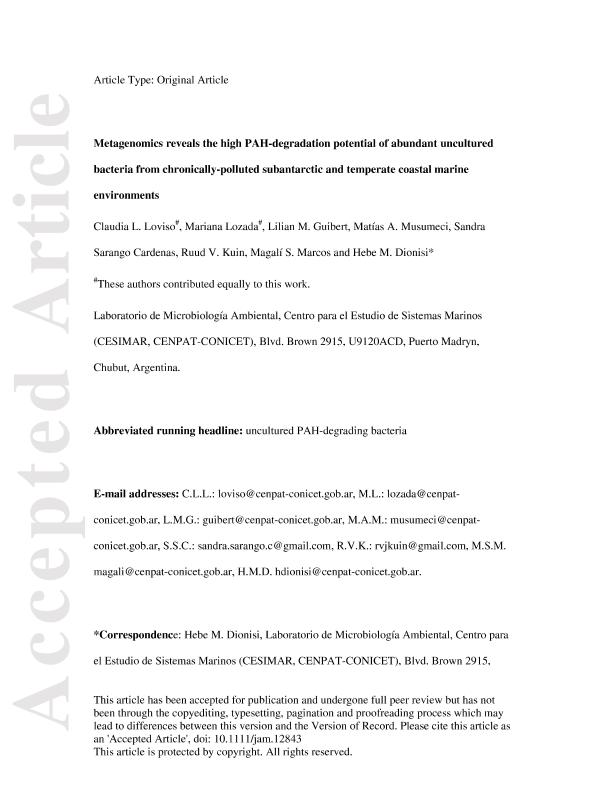Mostrar el registro sencillo del ítem
dc.contributor.author
Loviso, Claudia Lorena

dc.contributor.author
Lozada, Mariana

dc.contributor.author
Guibert, Lilian Marcela

dc.contributor.author
Musumeci, Matias Alejandro

dc.contributor.author
Sarango Cardenas, Sandra
dc.contributor.author
Kuin, Ruud V.
dc.contributor.author
Marcos, Magalí Silvina

dc.contributor.author
Dionisi, Hebe Monica

dc.date.available
2017-07-21T18:48:48Z
dc.date.issued
2015-06-16
dc.identifier.citation
Loviso, Claudia Lorena; Lozada, Mariana; Guibert, Lilian Marcela; Musumeci, Matias Alejandro; Sarango Cardenas, Sandra; et al.; Metagenomics reveals the high polycyclic aromatic hydrocarbon-degradation potential of abundant uncultured bacteria from chronically polluted subantarctic and temperate coastal marine environments; Wiley Blackwell Publishing, Inc; Journal of Applied Microbiology; 119; 2; 16-6-2015; 411–424
dc.identifier.issn
1364-5072
dc.identifier.uri
http://hdl.handle.net/11336/21103
dc.description.abstract
Aims: To investigate the potential to degrade polycyclic aromatic hydrocarbons (PAHs) of yet-to-be-cultured bacterial populations from chronically polluted intertidal sediments. Methods and Results: A gene variant encoding the alpha subunit of the catalytic component of an aromatic-ring-hydroxylating oxygenase (RHO) was abundant in intertidal sediments from chronically polluted subantarctic and temperate coastal environments, and its abundance increased after PAH amendment. Conversely, this marker gene was not detected in sediments from a nonimpacted site, even after a short-term PAH exposure. A metagenomic fragment carrying this gene variant was identified in a fosmid library of subantarctic sediments. This fragment contained five pairs of alpha and beta subunit genes and a lone alpha subunit gene of oxygenases, classified as belonging to three different RHO functional classes. In silico structural analysis suggested that two of these oxygenases contain large substrate-binding pockets, capable of accepting high molecular weight PAHs. Conclusions: The identified uncultured micro-organism presents the potential to degrade aromatic hydrocarbons with various chemical structures, and could represent an important member of the PAH-degrading community in these polluted coastal environments. Significance and Impact of the Study: This work provides valuable information for the design of environmental molecular diagnostic tools and for the biotechnological application of RHO enzymes.
dc.format
application/pdf
dc.language.iso
eng
dc.publisher
Wiley Blackwell Publishing, Inc

dc.rights
info:eu-repo/semantics/openAccess
dc.rights.uri
https://creativecommons.org/licenses/by-nc-sa/2.5/ar/
dc.subject
Intertidal Sediments
dc.subject
Metagenomic Library
dc.subject
Polycyclic Aromatic Hydrocarbons
dc.subject
Protein Modelling
dc.subject
Quantitative Pcr
dc.subject
Ring-Hydroxylating Oxygenases
dc.subject.classification
Bioremediación, Diagnóstico Biotecnológico en Gestión Medioambiental

dc.subject.classification
Biotecnología del Medio Ambiente

dc.subject.classification
INGENIERÍAS Y TECNOLOGÍAS

dc.subject.classification
Biología Celular, Microbiología

dc.subject.classification
Ciencias Biológicas

dc.subject.classification
CIENCIAS NATURALES Y EXACTAS

dc.title
Metagenomics reveals the high polycyclic aromatic hydrocarbon-degradation potential of abundant uncultured bacteria from chronically polluted subantarctic and temperate coastal marine environments
dc.type
info:eu-repo/semantics/article
dc.type
info:ar-repo/semantics/artículo
dc.type
info:eu-repo/semantics/publishedVersion
dc.date.updated
2017-07-20T14:21:08Z
dc.journal.volume
119
dc.journal.number
2
dc.journal.pagination
411–424
dc.journal.pais
Reino Unido

dc.journal.ciudad
Londres
dc.description.fil
Fil: Loviso, Claudia Lorena. Consejo Nacional de Investigaciones Científicas y Técnicas. Centro Nacional Patagónico; Argentina
dc.description.fil
Fil: Lozada, Mariana. Consejo Nacional de Investigaciones Científicas y Técnicas. Centro Científico Tecnológico Conicet - Centro Nacional Patagónico; Argentina
dc.description.fil
Fil: Guibert, Lilian Marcela. Consejo Nacional de Investigaciones Científicas y Técnicas. Centro Nacional Patagónico; Argentina
dc.description.fil
Fil: Musumeci, Matias Alejandro. Consejo Nacional de Investigaciones Científicas y Técnicas. Centro Científico Tecnológico Conicet - Centro Nacional Patagónico; Argentina
dc.description.fil
Fil: Sarango Cardenas, Sandra. Consejo Nacional de Investigaciones Científicas y Técnicas. Centro Científico Tecnológico Conicet - Centro Nacional Patagónico; Argentina
dc.description.fil
Fil: Kuin, Ruud V.. Consejo Nacional de Investigaciones Científicas y Técnicas. Centro Científico Tecnológico Conicet - Centro Nacional Patagónico; Argentina
dc.description.fil
Fil: Marcos, Magalí Silvina. Consejo Nacional de Investigaciones Científicas y Técnicas. Centro Científico Tecnológico Conicet - Centro Nacional Patagónico; Argentina
dc.description.fil
Fil: Dionisi, Hebe Monica. Consejo Nacional de Investigaciones Científicas y Técnicas. Centro Científico Tecnológico Conicet - Centro Nacional Patagónico. Instituto de Biología de Organismos Marinos; Argentina
dc.journal.title
Journal of Applied Microbiology

dc.relation.alternativeid
info:eu-repo/semantics/altIdentifier/url/http://onlinelibrary.wiley.com/doi/10.1111/jam.12843/abstract
dc.relation.alternativeid
info:eu-repo/semantics/altIdentifier/doi/http://dx.doi.org/10.1111/jam.12843
Archivos asociados
